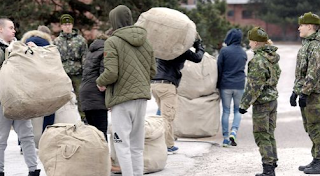"It began in the US with lurid claims and a hatred of the 'deep state'. Now it's growing in the UK, spilling over into anti-vaccine and 5G protests, fuelled by online misinformation. Jamie Doward examines the rise of a rightwing cult movement.He was desperate and scared and pleading for advice. "It's integrating itself into soft rightwing timelines and I believe it's starting to radicalise many. Seeing my mum and nan fall for it unaware is so troubling. I've seen it all over Facebook and these people genuinely believe they're revealing the truth."It is QAnon, the unfounded conspiracy theory that has gone through countless, bewildering versions since it emerged in the US in 2017 and is now spreading like California's wildfires across the internet.At its core are lurid claims that an elite cabal of child-trafficking paedophiles, comprising, among others, Hollywood A-listers, leading philanthropists, Jewish financiers and Democrat politicians, covertly rule the world. Only President Trump can bring them to justice with his secret plan that will deliver what QAnon's disciples refer to as 'The Storm' or 'The Great Awakening'."
Consumers buying chlorine dioxide solution on Amazon platform say they have been drinking fluid despite FDA warnings" ... Proponents of MMS falsely claim that it is a cure-all for almost all diseases, including malaria, HIV/Aids, cancer and now Covid-19. They also market it untruthfully as a cure for the condition autism.Since the start of the pandemic, the FDA has been trying to clamp down on fraudulent dealers of quack remedies claiming to protect against the virus. Last August the agency issued a strong health warning that MMS bleach products could be life-threatening.The American Association of Poison Control Centers has recorded more than 16,000 cases of chlorine dioxide poisoning, including 2,500 cases of children under 12. Many of those individuals suffered serious side effects, the group noted, including a six-year-old autistic girl who three years ago required hospital treatment for liver failure."
"My mom just didn't know what to do with me — I was doing drugs, I was out of control," Drew Barrymore recalled on her talk showWhen Drew Barrymore watched Paris Hilton's recent YouTube Originals documentary, she felt seen.In This Is Paris, a nearly two-hour film helmed by Emmy-winning director Alexandra Dean, Hilton goes into detail about alleged abuse she suffered at boarding school in Utah — and how her trauma has carried over into adulthood. During an appearance on Monday's episode of Barrymore's new talk show, the stars reflected on their shared experience of being placed at institutions for minors with behavioral issues."We've known each other throughout our kid life, adult life — I've known you for many years," Barrymore, 45, told Hilton, 39. 'I feel like when it comes to an interviewer, maybe they haven't had the same experiences as you. So they're coming at it from more of a journalistic, interested but slightly removed, place. Well, not this time. I've been where you've been. And watching your documentary — I mean, I don't know how many interviews and conversations I'm going to have on this show where I'm watching a mirror image of everything I've been through, as well.'"
Former traffic officer Sergei Torop, AKA Vissarion, arrested in special operation in Siberia"Russian authorities mounted a special operation to arrest a former traffic police officer who claims to be the reincarnation of Jesus and has run a cult based in the depths of Siberia for the past three decades.Helicopters and armed officers stormed communities run by Sergei Torop, known to his followers as Vissarion, and arrested him and two of his aides. Russia's investigative committee said it would charge him with organising an illegal religious organisation, alleging that the cult extorted money from followers and subjected them to emotional abuse."
"Finland's Supreme Court has banned a neo-Nazi group on the grounds that its activities are "significantly contrary to law." Police had sought to dissolve the right-wing Nordic Resistance Movement, known for being violent and openly racist, and two lower courts of law confirmed the ruling. Finland's highest court ruled that the group's activities "did not enjoy freedom of expression or freedom of association, as the association's activities by their nature entailed an abuse of these rights." In 2016, a fatal assault by a Finnish Neo-Nazi drew public attention and led to calls to ban racist and other extremist organizations in Finland."
News, Education, Intervention, Recovery
Intervention101.com to help families and friends understand and effectively respond to the complexity of a loved one's cult involvement.
CultRecovery101.com assists group members and their families make the sometimes difficult transition from coercion to renewed individual choice.
CultNEWS101.com news, links, resources.
Cults101.org resources about cults, cultic groups, abusive relationships, movements, religions, political organizations and related topics.
Selection of articles for CultNEWS101 does not mean that Patrick Ryan or Joseph Kelly agree with the content. We provide information from many points of view in order to promote dialogue.
Please forward articles that you think we should add to CultNEWS101.com.





